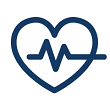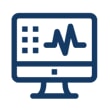What to know about high blood pressure, stroke and heart attack
High blood pressure—or hypertension—is a risk factor for stroke and heart attack, as well as other health conditions. Working with your doctor to monitor your blood pressure is one important way to stay on top of your overall health.

-
Know your numbers: Blood pressure
Each time you visit the doctor, you get your blood pressure taken. It’s important to know what your blood pressure numbers mean and why they matter.

-
How to spot a heart attack or stroke
Heart attacks and strokes have quite a bit in common: they are both medical emergencies caused by a sudden cut-off in blood flow. Learn about the signs and symptoms and how to tell the difference.

-
Start with prevention
There are many treatment options for high blood pressure and stroke. But preventing these conditions is even easier—and can pay off over your lifetime. Explore simple ways to maintain healthy blood pressure.

-
Life after stroke
The road to stroke recovery can be long, and it’s normal to experience physical, emotional and cognitive side effects. It’s important for you and your caregivers to know what to expect after returning home.

-
End-of-life planning and care
There’s no way around it: a stroke is life-threatening. While we always hope for the best outcome, it’s important to prepare for the worst. Here’s what you need to know about end-of-life planning and care options.

-
Download: Printable blood pressure tracking log
Tracking your blood pressure at home? Download our printable blood pressure tracking log to get started.

-
Find a care provider
Whether you’re looking for a cardiologist or a family care doctor, you can find an Adventist Health provider near you.


 More Motivation: Five Strategies to Reach Your Wellness Goals
More Motivation: Five Strategies to Reach Your Wellness Goals
 Why mental health matters: Signs and treatment of depression
Why mental health matters: Signs and treatment of depression
 Coping with Long COVID: Symptoms and Treatments
Coping with Long COVID: Symptoms and Treatments
 Diabetes Management: How to Take Control of Your Diabetes
Diabetes Management: How to Take Control of Your Diabetes
 December is Safe Toys and Gifts Month
December is Safe Toys and Gifts Month
 COPD Self-Care: Tips for Identifying It Early and Staying Healthy
COPD Self-Care: Tips for Identifying It Early and Staying Healthy
 Is Dense Breast Tissue Cause for Concern?
Is Dense Breast Tissue Cause for Concern?
 Treatment for Common Pelvic Floor Disorders
Treatment for Common Pelvic Floor Disorders
 Live Well With Diabetes
Live Well With Diabetes
 Diabetes and Your Mental Health
Diabetes and Your Mental Health